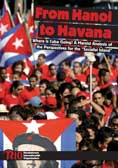



Archive for the Category 'Cuba'

 Raúl Castro has announced that the much-delayed congress of the Communist Party of Cuba (PCC) will take place in April 2011. The fifth congress of the PCC was held in October 1997, and the sixth has been postponed countless times. But after an interval of thirteen and a half years, the PCC’s (formally) highest body will finally meet. »»»»
Raúl Castro has announced that the much-delayed congress of the Communist Party of Cuba (PCC) will take place in April 2011. The fifth congress of the PCC was held in October 1997, and the sixth has been postponed countless times. But after an interval of thirteen and a half years, the PCC’s (formally) highest body will finally meet. »»»»
 read comments (0)
read comments (0)
 Where is Cuba Going? A Marxist Analysis of the Perspectives for the “Socialist Island”
Where is Cuba Going? A Marxist Analysis of the Perspectives for the “Socialist Island”
Cuba seems like an anachronism in today’s world. Other formerly “socialist” states reintroduced capitalism in the upheavals of the 1990s. In Russia, the Communist Party was toppled and its system collapsed. In China and Vietnam, the Communist Parties themselves led a controlled process of reforms to reestablish a market economy. Cuba alone has maintained to this day an economy which is dominated not by the laws of the market but by a plan. Will Cuba experience a chaotic reintroduction of capitalism like in Russia? Or a controlled restoration like in China and Vietnam? Will it remain an “anachronism”? Or will it develop in an entirely new direction?
Introduction and Chapter 1: Cuba today
Chapter 2: The Cuban Revolution
Chapter 3: From olive green to red
Infobox: The Cuban Revolution began in 1917…
Chapter 4: Cuban Bonapartism
Chapter 5: A degenerate workers’ state
Chapter 6: The “Special Period”
Chapter 7: Stabilization
Chapter 8: The military, the bureaucracy and the party
Chapter 9: The development of the economy
Chapter 10: The trajectory of the Cuban regime
Chapter 11: The “Chinese” road
Chapter 12: Three possible roads
Chapter 13: Tasks of Marxists + Bibliography
The first draft of these theses was written by Wladek Flakin (RIO, Berlin) in April 2010 and discussed at RIO’s seminar on Latin America in June 2010 and its Summer Academy in August 2010. Based on these discussions the text was expanded by Victor Jalava (RIO, Kiel). Members of the Left Block (LiBRo) from Rostock, the Marxist Initiative (MI) from Berlin and the New Anticapitalist Left (NAL) from the Czech Republic contributed to the discussion. Following, we will publish one chapter from the theses every two days for a month.

 Revolutionary Marxists outside Cuba have several fundamental tasks. We must defend the gains of the Cuban revolution against imperialism, particularly opposing the criminal US blockade of the island. At the same time, we must defend these gains against the plans of the ruling bureaucracy itself when it tries to take further steps towards capitalism. For this, we must strengthen the only conceivable social base of a second Cuban Revolution, an independent workers’ movement on the island. »»»»
Revolutionary Marxists outside Cuba have several fundamental tasks. We must defend the gains of the Cuban revolution against imperialism, particularly opposing the criminal US blockade of the island. At the same time, we must defend these gains against the plans of the ruling bureaucracy itself when it tries to take further steps towards capitalism. For this, we must strengthen the only conceivable social base of a second Cuban Revolution, an independent workers’ movement on the island. »»»»

 The PCC’s last congress was in 1997. The sixth congress, originally scheduled for 2008, has been postponed indefinitely. This is a sure sign of cracks within the bureaucracy which the top leadership is working to mend before they can show themselves at a congress. »»»»
The PCC’s last congress was in 1997. The sixth congress, originally scheduled for 2008, has been postponed indefinitely. This is a sure sign of cracks within the bureaucracy which the top leadership is working to mend before they can show themselves at a congress. »»»»

 The development of China since the early 1990s shows clearly that capitalism can be restored in a degenerate workers’ state without major changes to the political regime. It is noteworthy that the official Cuban press still refers to China as socialist, even though 2/3 of the country’s millionaires (and there are many!) are members of the Communist Party of China. More importantly, the entire economy with few exceptions is dominated by the laws of the market. China’s “economic miracle” has been based on the super-exploitation of hundreds of millions of peasants herded into the cities to work as cheap labor for multinational corporations. »»»»
The development of China since the early 1990s shows clearly that capitalism can be restored in a degenerate workers’ state without major changes to the political regime. It is noteworthy that the official Cuban press still refers to China as socialist, even though 2/3 of the country’s millionaires (and there are many!) are members of the Communist Party of China. More importantly, the entire economy with few exceptions is dominated by the laws of the market. China’s “economic miracle” has been based on the super-exploitation of hundreds of millions of peasants herded into the cities to work as cheap labor for multinational corporations. »»»»

 The Cuban regime is known for its internationalism – Fidel Castro was saluted by Nelson Mandela for the contribution made by Cuban troops to the struggle against Apartheid in South Africa. Cuban doctors in Venezuela and all over the world have made important contributions to raising the standards of living in the poorest countries. »»»»
The Cuban regime is known for its internationalism – Fidel Castro was saluted by Nelson Mandela for the contribution made by Cuban troops to the struggle against Apartheid in South Africa. Cuban doctors in Venezuela and all over the world have made important contributions to raising the standards of living in the poorest countries. »»»»

 The defining feature of the Cuban economy today is the blockade imposed by the United States government in 1962 under the “Trading with the Enemies Act”, tightened again in 1996 with the “Healms-Burton Act”. Cuban sources estimate that in the last fifty years the Cuban economy has lost roughly US$86 billion due to this blockade[38]. »»»»
The defining feature of the Cuban economy today is the blockade imposed by the United States government in 1962 under the “Trading with the Enemies Act”, tightened again in 1996 with the “Healms-Burton Act”. Cuban sources estimate that in the last fifty years the Cuban economy has lost roughly US$86 billion due to this blockade[38]. »»»»

 Cuba’s joint ventures are run primarily by the Revolutionary Armed Forces (FAR). The long-time leader of the FAR and now prime minister of the island, Raúl Castro, has been considered a “reformer” since the 1980s. Military companies are now the largest partner of foreign capital in Cuba, controlling some 40% of GDP: the tourism holding company Gaviota S.A., owned by the FAR, is one of the largest companies on the island[33]. »»»»
Cuba’s joint ventures are run primarily by the Revolutionary Armed Forces (FAR). The long-time leader of the FAR and now prime minister of the island, Raúl Castro, has been considered a “reformer” since the 1980s. Military companies are now the largest partner of foreign capital in Cuba, controlling some 40% of GDP: the tourism holding company Gaviota S.A., owned by the FAR, is one of the largest companies on the island[33]. »»»»

 Cuba’s economy has seen a certain stabilization since 1999 when Venezuela began shipping cheap oil in exchange for Cuban doctors. This made it possible for the government to de-dolarize the economy, introducing the convertible peso in 2004. However, to this day, two currencies exist in Cuba: the “normal” peso paid to state workers and the convertible peso, pegged to the dollar, which is available from remittances, tourists etc. »»»»
Cuba’s economy has seen a certain stabilization since 1999 when Venezuela began shipping cheap oil in exchange for Cuban doctors. This made it possible for the government to de-dolarize the economy, introducing the convertible peso in 2004. However, to this day, two currencies exist in Cuba: the “normal” peso paid to state workers and the convertible peso, pegged to the dollar, which is available from remittances, tourists etc. »»»»

 In the mid 1980s, the Cuban leadership introduced a campaign of rectificación and recentralization of the economy. Going against the zeitgeist of Michail Gorbatchov’s Perestroika programm, this might have saved the Cuban system from complete collapse when the Council for Mutual Economic Assistance fell apart and with it a big part of Cuba’s foreign trade[20]. The response to this was the “Special Period in Times of Peace”, which began on July 26, 1990. By 1993, Cuba’s GDP had sunk by 30% – oil imports even by 70%[21]. »»»»
In the mid 1980s, the Cuban leadership introduced a campaign of rectificación and recentralization of the economy. Going against the zeitgeist of Michail Gorbatchov’s Perestroika programm, this might have saved the Cuban system from complete collapse when the Council for Mutual Economic Assistance fell apart and with it a big part of Cuba’s foreign trade[20]. The response to this was the “Special Period in Times of Peace”, which began on July 26, 1990. By 1993, Cuba’s GDP had sunk by 30% – oil imports even by 70%[21]. »»»»

 Cuba’s system fits in with Leon Trotsky’s analysis of a degenerate workers’ state: a society in which the private property of the means of production has been abolished (a precondition for the transition to socialism) but in which a privileged bureaucracy controls all political and economic institutions and suppresses all independent activity by the masses. Therefore, the transition to socialism – the withering away of the state as the working population increasingly takes over all tasks of administration – is blocked. And as a result, the whole system tends to slide back to capitalism. »»»»
Cuba’s system fits in with Leon Trotsky’s analysis of a degenerate workers’ state: a society in which the private property of the means of production has been abolished (a precondition for the transition to socialism) but in which a privileged bureaucracy controls all political and economic institutions and suppresses all independent activity by the masses. Therefore, the transition to socialism – the withering away of the state as the working population increasingly takes over all tasks of administration – is blocked. And as a result, the whole system tends to slide back to capitalism. »»»»
